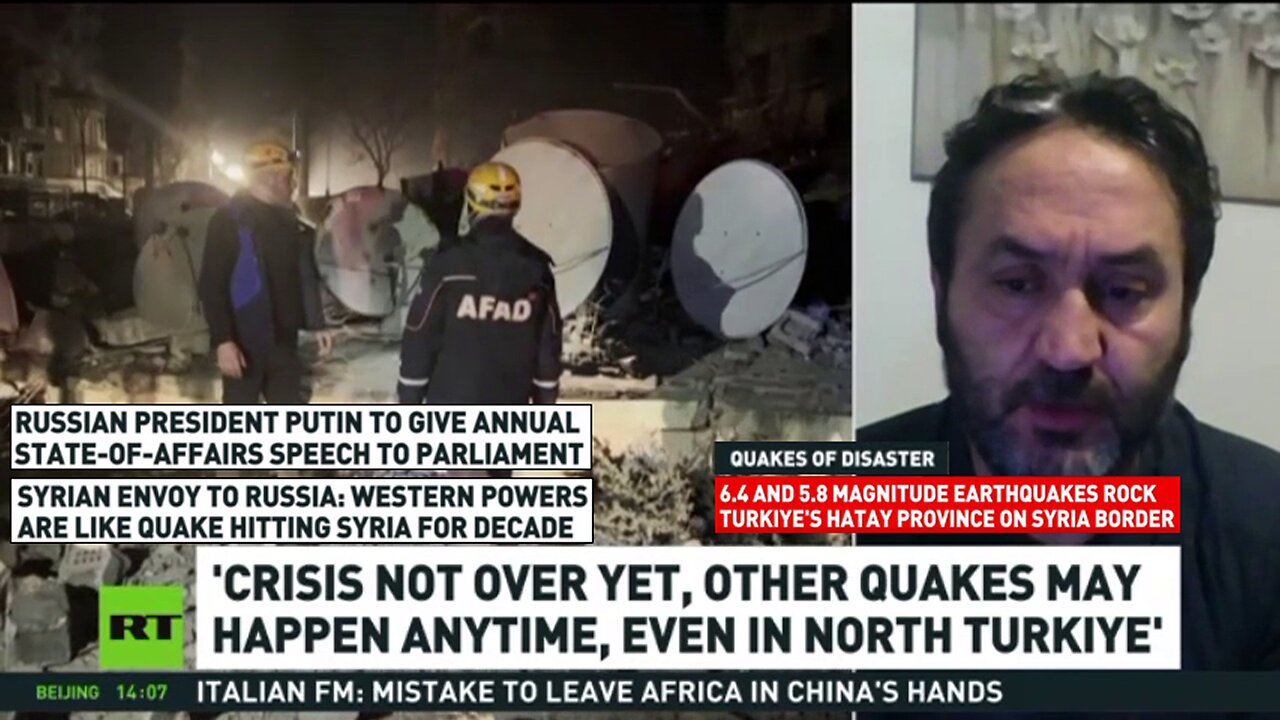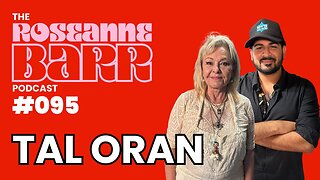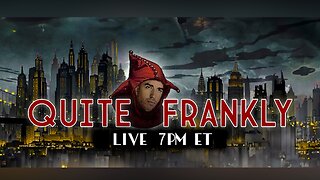Premium Only Content

RT News - February 21st 2023
Russia's President Vladimir Putin is soon set to give his annual speech to the country's parliament, amid the anniversary of the military operation in Ukraine. Joe Biden will apparently be addressing the Russian public as well. Donald Courter talks with Mourad ahead of the speech.
Yet another series of earthquakes hits southern Türkiye, with three people reported killed and about 300 others injured, as the death toll from previous, massive quakes in the region has surpassed forty thousand. There could be more earthquakes and aftershocks in the region. It's all made more difficult to cope with when the people can't get aid. Sanctions still kill in many ways. Bashar Jaafari speaks with RT.
USA/Türkiye "trade" (the arms racket) When Türkiye bought some AS400 systems, etc. from Russia, USA acting as a sales broker for the military industrial complex, removed Türkiye from the F-35 programme but they have never given back the $1.4 billion that Türkiye had to pay upfront for them. Quite rightly, they want their money back. In depth analysis from Mesut Hakki Casin.
NATO/Finland: (QS: Please watch this yourself as I can't understand why any country would want to join the political-only alliance of the worlds most indebted nations and ride roughshod over the citizens by not giving them the plebiscite/referendum they are due. I have yet to see anything good to come from this body of fraudsters who even make it impossible for the citizens who are forced to pay for it, hold public meetings to discuss it. My contempt for this body is boundless)
All eyes on Africa - after years of plunder and neglect, the west are getting worried that deals of mutual cooperation and benefit with China and Russia might push the west's colonial-type interests out of the continent. (QS: Russia and China report on everyday life in Africa daily for years, hold summits for African governments and businesses and both China and Russia have friendly and strategic presence on the continent aimed at their citizens betterment/self improvement, health-care without big-pharma pushes or dependencies etc etc. Not quite sure what the colonialists left except a great deal of resentment). Rachel Marsden analyses. Koffi Kouaku says the no-win situation from the west must stop. Western powers discuss increasing their presence in Africa, asserting that the continent cannot be left to strengthen its ties with China.
Nord Stream 2 sabotage / terrorism / an Act of War against countries and the citizens : A NATO officer sends a letter to former US Marine John Mark Dougan, saying he saw a suspicious US naval crew around Russia's Nord Stream pipeline system before it was blown up. RT talks to John Mark Dougan.
Silencing Dissent : Gal Luft has been arrested in Cyprus for arms dealing. He denies the charges. RT looks at what is going on especially in respect to claims that Luft's testimony could be critical in the Hunter Biden case. Mordechai Tzivin, Luft's lawyer discusses.
The world's biggest "gun show" (defence weaponry, transports all sorts, exhibition) is taking place in U.A.E. https://idexuae.ae/ with the largest number of "participants" known since 1993. (QS - you might find this helpful, if you're in the market 😎https://digital.eventguides.co.uk/html5/reader/production/default.aspx?pubname=&pubid=c1d4ab84-a694-4d87-8da4-0709b5696531&utm_source=idex&utm_medium=popup&utm_campaign=idex_website_2023&utm_id=idexwebsite)
-
-
About Pres. Putin's annual speech :
The annual message to lawmakers sets out the country’s domestic and foreign policy
Russian President Vladimir Putin addresses the Federal Assembly, the country’s main legislative body, in a key annual program speech.
The Kremlin said ahead of this address that the president is expected to provide an extensive assessment of the ongoing military campaign in Ukraine, as well as commenting on the global situation. He will also set out Russia’s foreign and domestic policy goals for the near future.
Under the Russian constitution, the country’s president should address the parliament every year. Previously, such events were regularly held in December. In 2022, the speech was postponed amid the continued military conflict between Moscow and Kiev.
At that time, Pres. Putin cited rapid developments that made any thorough assessment of the situation quite difficult as the reason for postponing the event. The speech is now being held ahead of the one-year anniversary of the start of the Russian military operation in Ukraine.
The Federal Assembly consists of the lower house of parliament, the State Duma, as well as the Federation Council, the upper house.
I will try to upload it (in English if possible) as soon as it becomes available, and a transcript if not)
================================
Below via RT and 1 other website ---- 1) --- Zelensky ‘commanding’ US military – congresswoman
1a) --- Politico: Kiev fears that Washington will force him to deal with Moscow (via TASS)
2) --- Baltic nation urges West to cross ‘red lines’ on Ukraine
2a) --- EU member disrupts traffic with key Russian ally
2b) --- Russia’s closest ally provides details on new militia (important)
3) --- EU prolongs Russia sanctions
4) --- Under siege: How has Donbass lived through its first year of official separation from Ukraine? Feature, Long read.
5) --- Russian spy agency reports on NATO arms deliveries to Ukraine
6) --- Zelensky changes stance on key battle in Donbass
7) --- Estonian PM wants to rewire Russian brains
8) --- Chechen leader wants own private military company
9) --- Zelensky spent two months in bunker – The Times
============================================
21 Feb, 2023 08:01
1) --- Zelensky ‘commanding’ US military – congresswoman
The Ukrainian leader is edging Washington towards a “world war,” Marjorie Taylor Greene has claimed after Biden’s trip to Kiev
Ukrainian President Vladimir Zelensky is pushing the US military closer to a global conflict, Republican Congresswoman Marjorie Taylor Greene said on Monday. Her statement followed US President Joe Biden’s unannounced trip to Kiev the same day.
“Biden didn’t go to East Palestine, Ohio on President’s Day,” Greene, a congresswoman from Georgia, wrote on Twitter, referring to a small US town where a train carrying hazardous materials derailed earlier this month. “He went to Ukraine, a NON-NATO nation, whose leader is an actor and is apparently now commanding our United States military to world war.”
The congresswoman argued that Washington’s support for Kiev has been “like a US proxy war with Russia” that is “now becoming more like a US-China war through the Ukraine-Russia war.” Greene insisted that Biden must be impeached “before it’s too late.”
A vocal critic of Biden’s foreign policy, Greene has been among US politicians calling for an audit of the country’s military and economic aid to Ukraine. Congress blocked a motion on the matter in December.
Biden made an unannounced trip to Kiev on Monday, almost a year after Moscow launched its military operation in the neighboring state. He unveiled a new $460 million aid package, which includes ammunition for HIMARS multiple rocket launchers and Javelin shoulder-fired anti-tank weapons. According to the Pentagon, Washington provided Kiev with $30.4 billion in security assistance between February 24, 2022 and February 20, 2023.
Russia has maintained that foreign weapons will not change the course of the conflict. The country’s foreign minister, Sergey Lavrov, has said that by helping Ukraine, NATO has been waging “a proxy war” against Moscow. Kremlin spokesman Dmitry Peskov said this month that the US-led alliance’s military infrastructure was “working 24/7” to sustain Ukraine.
https://www.rt.com/news/571815-greene-zelensky-us-army/
=============================================
February 21, 06:38
1a) --- Politico: Kiev fears that Washington will force him to deal with Moscow (via TASS)
According to the publication, Kiev believes that the democratic administration of Joe Biden can "use Congress", which is controlled by Republicans, as an excuse for curtailing military assistance
BRUSSELS, February 21. /TASS/. Concerns are growing in Kiev that the United States could reduce military assistance to Ukraine in order to force it to conclude a peace agreement with Russia. This was announced on Tuesday by the European version of the publication Politico.
"I think that on Capitol Hill [ in the US Congress ], and in the administration of [ American President Joe Biden ] there are people who would like to calibrate military aid volumes, to encourage Ukrainians to conclude a deal [ with the Russian Federation ], "he quotes one of the advisers to the President of Ukraine who wished to remain anonymous. Kiev fears that the Biden democratic administration may “use Congress”, which is controlled by Republicans, as an excuse for curtailing military assistance so that Ukraine “agrees to set more modest military goals for itself,”", clarifies the publication.
Earlier, US House Speaker Kevin McCarthy warned that Republicans in the Congress of the current convocation would not allow Washington to provide unlimited and uncomplicated financial assistance to Ukraine. In November, Republicans prepared a resolution to control the spending of funds allocated by Congress to help Kiev.
https://tass.ru/mezhdunarodnaya-panorama/17100749
============================================
21 Feb, 2023 08:38
2) --- Baltic nation urges West to cross ‘red lines’ on Ukraine
Constraints on supplying weapons to Kiev only exist “in our minds,” the Lithuanian president says
Ukraine’s Western backers should abandon all limitations on military aid and quickly supply Kiev with the weapons it needs in the conflict with Moscow, Lithuania’s President Gitanas Nauseda has said.
“This is very important that we cross these red lines, which are in our minds and don’t really exist in reality. Maybe sometimes Russia tries to set up those red lines instead of us,” Nauseda told CNN on Monday.
He said his “message” to the West was: “Not [to] waste the time. Be decisive, be united and take decisions as quick as possible” on delivering weapons to the Kiev government.
The leader of Lithuania, which is a member of both NATO and the EU, welcomed the surprise visit of US President Joe Biden to the Ukrainian capital Kiev earlier that day, saying that it sent a strong message of unity to the allies and was proof that Ukraine wouldn’t be abandoned by the West.
While in Kiev, Biden promised to announce “another half a billion dollars” in military aid to Ukraine later this week. The package would include “artillery ammunition for howitzers, more javelins, anti-armor systems, air surveillance radars” and more, he said.
After securing promises to send main battle tanks from its foreign backers last month, the Ukrainian government of Vladimir Zelensky has intensified its call for warplanes as well, including US-made F-16s, and longer-range missiles.
Washington and other allies have so far been reluctant to deliver such hardware to Ukraine over concerns that it could lead to a major escalation and a direct clash between NATO and Russia.
Moscow has said that its own ‘red line’ would be Western supplies of longer-range and more powerful weapons to Ukraine that would enable it to carry out attacks deep inside Russian territory.
Russia has long decried deliveries of arms to Kiev by the US, EU, UK and others, arguing that they only prolong the fighting, while being unable to change its outcome. According to Moscow, such deliveries as well as intelligence sharing and training provided to Ukrainian troops have de facto already made Western nations parties to the conflict.
https://www.rt.com/russia/571816-nato-weapons-ukraine-lithuania/
================ Recall
16 Feb, 2023 07:50 - repost
2a) --- EU member disrupts traffic with key Russian ally
Lithuania has suspended border cooperation with Belarus, the government in Minsk has reported
Lithuania has decided to suspend cooperation with Belarus on ensuring uninterrupted transport flow across their mutual border, Minsk announced on Thursday citing a notice it received from Vilnius.
Under a November 2019 agreement, the two nations’ border and customs services pledged to improve connectivity, the State Border Control Committee of Belarus (GPK) said in a statement. It added that Lithuania’s State Border Guard Service (VSAT) had not offered any rationale for the policy change in its notice.
The VSAT did not immediately confirm the news. But on Thursday it published statistics on the number of illegal immigrants it had intercepted on the border with Belarus. It put the number at 19,646 since the beginning of the Belarus-EU border crisis and 11,211 last year alone.
The border confrontation between Minsk and its neighbors, the EU nations Poland, Lithuania and Latvia, unfolded in the summer of 2021, when they reported a surge in the number of asylum seekers, most of them from the Middle East, arriving via Belarus.
The three nations accused the Belarusian government of orchestrating the crisis, which Minsk denied, and employed some heavy-handed tactics to prevent people from entering their territory.
The human rights group Amnesty International documented various forms of abuse of the refugees by Polish, Lithuanian and Latvian authorities and accused the EU leadership of turning a blind eye to the three member states violating the bloc’s laws.
https://www.rt.com/russia/571563-belarus-luthiania-border-traffic/
============
20 Feb, 2023 15:16
2b) --- Russia’s closest ally provides details on new militia
The force is needed amid the conflict in Ukraine, the Belarusian defense minister says
The new people’s militia being created in Belarus could number up to 150,000 personnel, according to Defense Minister Viktor Khrenin.
Minsk is closely monitoring developments in Ukraine and sees the need for a people’s force in addition to the country’s military, Khrenin told the Belarus Segodnya outlet on Monday.
The new militia will be tasked with “helping the local authorities maintain order during martial law,” which could be introduced if a conflict in a neighboring state spills over into Belarus, he said.
“Activities of various sabotage groups, spikes in crime, looting – anything could happen,” the minister noted of the challenges that the new force may face.
First and foremost, units will be needed in rural areas “where one district police officer sometimes services several village councils,” Khrenin stated, adding that the people’s militia could also be deployed in cities if the local authorities deem it necessary.
Belarus has allowed close ally Moscow to use its territory during the military operation in Ukraine, but has declined to involve its own forces in the fighting. Belarusian President Alexander Lukashenko said last week that the situation would change only if Ukraine launched a direct attack on his country.
Kiev has insisted it does not have aggressive intentions towards its neighbor, but warned that it is “prepared for any scenario.” Ukraine has also been actively working to fortify its border with Belarus.
Moscow and Minsk set up a joint military force on Belarusian territory in the fall to address perceived threats from the West, which, according to Lukashenko, is eager to drag the country into the Ukrainian conflict in order to extend the frontline and stretch the Russian forces.
https://www.rt.com/russia/571782-belarus-peoples-militia-khrenin/
===============================================
21 Feb, 2023 09:02
3) --- EU prolongs Russia sanctions
A tenth round of restrictions is expected later this week
The European Union has extended for another year an array of anti-Russian sanctions imposed over the conflict in Ukraine. The EU leadership acknowledged that it is running out of targets for new restrictions.
The decision adopted by the EU Council on Monday means the measures have been prolonged until at least February 24, 2024.
Members pledged “unwavering” support for Kiev in its fight against Moscow, with the foreign ministers of EU states expressing solidarity in a video address. The bloc’s foreign policy chief, Josep Borrell, accused Russia of attacking a “peaceful neighbor” one year ago, and claimed that Moscow had expected to win the conflict “in a few days.”
The Russian government has insisted that its military operation was necessitated by Kiev’s continued attacks against civilians in Donbass and the creeping expansion of NATO into Ukraine.
The EU has been targeting Russia with sanctions since 2014, when an armed coup in Kiev toppled the Ukrainian government and prompted the region of Crimea to break away and rejoin Russia.
Since last February, the EU has cut much of its trade with Russia, leading to consequences such as a surge in energy prices. This week, a tenth package of sanctions is expected to be adopted. The new blacklist will reportedly feature high-tech goods, but also some symbolic items, including toilets.
However, European Council President Charles Michel acknowledged last week that there are “not many things left” for Brussels to target. Speaking to a Belgian newspaper, the official argued that “each debate on sanctions is much more difficult than the previous one.”
The latest stumbling block was reportedly synthetic rubber. Some member states such as Poland want to ban trade in the compound with Russia, while others, including Germany and Italy, opposed such a move, Politico reported last week. EU member states previously clashed over proposed restrictions on Russian hydrocarbons, petroleum products, diamonds, and nuclear technology.
https://www.rt.com/news/571817-eu-sanctions-russia-prolonged/
-
https://twitter.com/DontDenyThe/status/1626299798734110720
-
===========================================
21 Feb, 2023 08:48
4) --- Under siege: How has Donbass lived through its first year of official separation from Ukraine? Feature, Long read.
Exactly twelve months ago, Russia recognized the independence of the Donetsk and Lugansk People's Republics
On the evening of February 21, last year, Vladimir Putin delivered a speech officially recognizing the independence of the Donetsk People’s Republic (DPR) and the Lugansk People’s Republic (LPR).
It stunned the world, and set the course for events which have dominated the headlines since.
Agreements on friendship, cooperation, and mutual assistance were signed on the same day. This historical event has ultimately changed the lives of the residents of both republics, prefaced Moscow’s military offensive in Ukraine and the entry of four new regions into the Russian Federation at the end of September. However, for Donbass residents, the year was marked not just by events of global importance, but also by a series of perhaps less well-known developments.
The background story
-
When the Western-backed coup (directed against Russia, among other things), took place in Kiev on February 23, 2014, it launched counter-processes in what was then eastern Ukraine. This marked the beginning, of what was know as the, “Russian Spring” – a series of pro-Moscow protests in Crimea and Novorossiya [a largely historical term for an area comprising eight regions of southeastern Ukraine— RT]. Supporters of the movement originally advocated the creation of an independent state recognized by Moscow or the direct accession of the territories to the Russian Federation.
As of 2014-2015, this goal had been accomplished only by residents of Sevastopol and Crimea. In Donbass, the signing of the Minsk Agreements put a temporary end to full scale fighting, with the confrontation largely shifting into politics and diplomacy. However, the regular shelling of the region's cities continued. As part of the Minsk Agreements, Russia recognized the republics of Donbass as an autonomous part of Ukraine while protests in other regions were suppressed by Kiev.
Over the following years, the realization grew that the Minsk Agreements would not be kept. Since the start of last year's military offensive, Western leaders have openly admitted that the treaties were initially regarded as a pause before a new phase of war.
Several milestones marked those years: Russia’s decision to recognize documents issued in Donbass (2017), the simplified acquisition of Russian citizenship for residents of the self-proclaimed republics (2019) and their right to vote in the parliamentary elections of the Russian Federation (2021). Starting in 2020, Donbass officials also supported the “integration” course by modifying legislation and introducing Russian social support services and electronic public services.
Ideologically, these processes were backed by a doctrine called “Russian Donbass”, issued in late 2020-2021. The document proclaimed the republics a part of the Russian national state, with a historical goal of joining with Moscow. Its publication did not spark much of a reaction – either positive or negative. The people were expecting more determined steps from the Russian authorities.
Throughout this time the Ukrainian army continued dropping bombs on Donbass residents, including those who acquired Russian citizenship. Meanwhile, the region faced a humanitarian disaster and growing poverty caused by economic disruption.
Official recognition of independence and security guarantees from Moscow were supposed to solve these problems.
Security guarantees for Donbass
Around February 17, 2022, Donbass experienced an escalation of the conflict accompanied by attacks on residential areas. This usually happened once every year or two: both parties would bring their armies to the front line and would try to scare the other. Initially, this escalation was seen the same way. But the recognition of Donbass and the ensuing security guarantees had changed the game.
In the days of February 21-23, one of the biggest disputes was centered on defining the borders of the republics recognized by Vladimir Putin as the DPR and the LPR. Donbass residents understood that their future and bringing an end to the fighting, depended on the answer to this question.
In light of their recent history, few people wanted active combat to resume. But there was resounding faith that the Russian army would meet its responsibility to protect the people of Donbass from Ukrainian attacks.
Evacuation of civilians to the Russian Federation
-
In light of the growing danger, the Head of the DPR Denis Pushilin announced the evacuation of civilians on February 18, 2022. Over the next three days, over 60,000 people became refugees. Social workers caring for orphans and people with disabilities were also re-located to Russia.
Unfortunately, hundreds of thousands of people underestimated the danger. Refusing to evacuate, they remained near the frontline and faced increasing attacks.
Mobilization in Donbass and the start of combat
-
On February 19, 2022, the DPR and LPR announced general mobilization. Many veterans who had left the armed forces at the time of the Minsk Agreements now joined the People's Militia as volunteers.
However, a great number of men with no prior combat experience were also called up to serve in the army. In some cases, the DPR and the LPR armies had no proper ammunition. For example, some of the mobilized were equipped with steel helmets and armed with Mosin-Nagant rifles (used by the Russians in the First World War). They formed rifle battalions and mobilization reserve regiments and were supposed to occupy the third line of defense. However, without any proper training, these divisions were sent to participate in the fighting during February and March, including the battles for Mariupol, where they suffered major losses.
The republics lost a significant number of critically important specialists as a result of the mobilization: doctors, power engineers, gas and water supply service workers, drivers, and other professionals.
Multiple violations accompanied the mobilization process. For example, some students were taken into the army. They were demobilized after the DPR and LPR joined Russia. Presently, the mobilization in Donbass has been paused. The issue is now under the jurisdiction of the Ministry of Defense of the Russian Federation and is synchronized with Russia’s national policy.
The liberation of Mariupol and the influx of refugees
-
In 2014, Mariupol was the second largest city in Donbass, with a population of 450,000 people. It was also the center of metallurgy and the region’s main port. After the outbreak of hostilities in 2014, it was briefly controlled by the DPR, but in June came under the control of the Ukrainian government. For the eight years that followed, the front line was located 20 km from the eastern outskirts of Mariupol. The city served as the eastern outpost of the Ukrainian army. The Azov Regiment of the National Guard of Ukraine, known for its pro-Nazi ideology, occupied significant positions.
After the start of the military offensive, Mariupol became one of the key strategic and political targets due to its economic potential and the city’s location along the Rostov-on-Don—Dzhankoy highway, known as the “land corridor to Crimea”. The battle for Mariupol continued from the first days of the attack until May 20, when the remaining fighters of the Ukrainian garrison, hidden away in the dungeons of the Azovstal metal works, finally capitulated.
Mariupol suffered an extreme blow during these battles and a major portion of its residential buildings were destroyed. Since Ukraine did not evacuate the city’s residents and sabotaged humanitarian corridors, hundreds of thousands of people became hostages in their hometown.
At this time, the DPR’s emergency services were overwhelmed by a sudden influx of refugees. Before the issue was taken up by the Russian state and its political structures, Moscow's military and even journalists who covered the storming of the city helped with humanitarian aid. Volunteers continue to play an important role in providing humanitarian assistance in Donbass to this day.
For the first time in eight years, residents of Donetsk had a chance to provide aid, not only receive it. A wide network of volunteers helped refugees housed in schools and other non-functioning institutions.
This situation also sparked the first clashes between Donbass residents and the people who lived in territories previously under Ukrainian control. Certain conflicts resulted from an increase in paranoia and mistrust among locals who suspected that migrants might be spies or saboteurs. Although the suspicions were mostly groundless, Ukrainian operatives did sometimes pose as refugees, as in the case of the murder of Daria Dugina.
The brief comeback of the Ukrainian hryvnia
-
Initially, the DPR and LPR had a dual currency and preserved economic ties with Ukraine. However, after the economic blockade imposed by Kiev in 2016, the grivna was replaced by the Russian ruble. The Ukrainian currency was brought in only by senior citizens who traveled to the country to collect their pensions.
After many territories were liberated and Ukrainian banknotes started circulating in cash, Donbass authorities set a fixed exchange rate and residents saw a brief comeback of the nearly forgotten currency. However, the grivna wasn’t able to gain a foothold in the region and as of 2023, it is no longer in circulation outside of the currency exchanges.
Liberation of the entire LPR
-
The LPR later came under the complete control of Russian troops. This was achieved through the liberation of the Lisichansk-Severodonetsk urban agglomeration. The battles were as important for the LPR as the battles for Mariupol were for the DPR.
In July 2022, Russian troops established control over the entire length of the LPR border. Though the full control lasted only two months before the retreat from the Kharkov region in September-October, Lugansk ceased to be a front-line city.
Large-scale reconstruction of Donbass infrastructure
-
For the period of eight years following the signing of the Minsk agreements, Donbass seemed stuck in time, somehow preserving the urban infrastructure that existed before the war. In some places, like Donetsk, the infrastructure was good, but in others, like Makeyevka or Lugansk, things were a lot worse. In rural areas, some schools still had outside bathrooms and the Ukrainian roads, known for their poor quality, broke under heavy military machinery.
Last year, some major changes occurred. The Russian Federation created a program of patronage over Donbass cities and districts. Moscow took responsibility for Donetsk and Lugansk and St. Petersburg did the same for the destroyed city of Mariupol.
Thousands of specialists, construction workers, water supply engineers, doctors, and others necessary for the proper functioning of the civil infrastructure, were sent to Donbass. Investments from Russia also flowed into the region.
Donetsk is still unable to fully participate in the program, because the city is constantly being attacked by the Ukrainian army. But in Lugansk and Mariupol, where the fighting has ended, reconstruction is in full swing. This includes the roads, the bridge over the Seversky Donets River, water treatment infrastructure, and public transport in Lugansk. As for Mariupol, it’s being practically rebuilt from scratch, including hospitals and schools.
The arrival of Russian companies in Donbass
-
Before the start of the military campaign, Donbass residents had to resort to different schemes in order to use bank cards, since the republics had no functioning banking infrastructure. The closest the people had to a bank were local structures used for paying taxes and utility bills, as well as receiving pensions and salaries from the state, as it was.
Many Donbass residents also relied on the services of “cashiers” – for a 5% commission, these people could receive money sent from abroad and pay it in cash. Such operations were carried out on the basis of trust, and weren’t regulated by law.
After Russia officially recognized the republics, the first Russian bank, Promsvyazbank (PSB), appeared in the region. Despite limited functionality in terms of lending and other banking services, PSB integrated Donbass into the Russian banking system and eliminated the need for illegal money schemes.
Similar changes affected mobile service providers. Donbass was previously served by two local mobile network providers, “Phoenix” and “Lugakom”, both of which relied on the infrastructure of Ukrainian mobile service providers. By the end of 2022, roaming services were provided by Russian mobile service providers Beeline, Megafon, and Tele2.
No more borders between the DPR, LPR, and Russia
-
After the Donbass republics joined Russia, the state border was eliminated. This applied both to the frontier between Donetsk and Lugansk, which, despite allied relations remained in place during the 8 years of conflict, and the border with Russia.
These barriers represented a considerable inconvenience for Donbass residents, since trips to Russia and back took longer, and involved sizeable queues. Moreover, since the Donbass republics were outside the Russian customs zone, delivery costs increased, which negatively affected the local economy.
The state border as an economic boundary has now been eliminated. Posts remain to check documents and prevent the illegal transport of weapons or ammunition.
No water or central heating, and new pipelines that merely delay disaster
-
The main humanitarian crisis faced by DPR residents over the past year has been the lack of a reliable water supply. Beforehand, both sides depended on the Seversky Donets-Donbass water canal: water from Slavyansk flowed to the DPR, and then to Mariupol, which was then under Ukrainian control. However, following the start of the military operation and the battle for Mariupol, Ukraine blocked the canal.
This resulted in a humanitarian disaster regarding water supply, sanitation, and hygiene. In some areas of Donbass, water was supplied once in three days according to a schedule which allowed people to collect just enough water to partly maintain hygiene. However, there were areas that had water once a month at best, while in others, it was gone for good.
As a result, people ran to get drinking water under shelling, collected rainwater, and washed in the far-from-clean Kalmius River. The cost of drilling individual water wells surged to 100 thousand rubles.
The construction of water pipelines from the region’s eastern reservoirs did not considerably improve things and only made up for the losses of the Donetsk reservoir. Finally, weary of waiting for the liberation of Slavyansk, Russian authorities sponsored the construction of a water pipeline from the Rostov region, set to be completed in the spring of 2023. However, even this will not fully resolve the supply issue.
With the arrival of cold weather, the situation became disastrous. In some areas, the central heating system could not be filled up with the required amount of water and stopped functioning altogether.
Mined cities and increasing strikes
-
In 2022, 1,091 people died from Ukrainian strikes and another 3,533 were injured, in the DPR. These numbers are comparable to those of 2014-2015. Renewed hostilities and high-intensity fighting have turned the life of Donbass residents into hell. Whereas several years ago, active strikes occurred only in the front-line regions deserted by civilians, now the densely populated areas of Donetsk, Gorlovka, and Makeyevka have come under direct attack.
Moreover, the Armed Forces of Ukraine started mining Donbass cities using PFM-1 mines (also called “Butterfly” mines) that explode upon contact and disable civilians. The effects remain engraved in the memory of people and preserved in local lore – like in this video of a woman who collected such “butterflies” to show her colleagues at work, or the video demonstrating an improvised attempt to remotely blow up the mines, or the lyrics of Donbass musicians.
As of February 2023, Donetsk is no longer a city excited by a possible end to its eight-years of turmoil. It has become a place where, on the heels of an attack by MLRS Grad, residents flock to nearby shops for cigarettes, knowing they’ve got 30-60 minutes before the rocket launcher is recharged and transferred to another position.
Military and civilian deaths
-
Donbass has lost many residents and supporters who settled in the region. Among those who died was Olga Kachura (military nickname “Korsa”), the only female commander of a rocket battalion and a hero of Gorlovka.
Taras Gordienko (“Clooney”), an intelligent but tough and effective commander who worked in IT before the war, was killed during the storming of Mariupol. In Volnovakha, Vladimir Zhoga (“Vokha”) who took over the legendary “Sparta” division after the death of its founder Arsen Pavlov (“Motorola”), died during the evacuation of civilians. Igor Mangushev (“Bereg”), who for the past six months had been engaged in developing a means to combat drones, was also killed.
These victims are only some of the more well-known names. Unfortunately, the war has affected almost every household in Donbass. All the things the locals had dreamed about – security guarantees, peaceful skies, a return to normal life and a fully functioning region – have not yet come to pass. They still need to be achieved.
-
By Vladislav Ugolny, a Russian journalist based in Donetsk
https://www.rt.com/russia/571795-year-since-russia-recognized-donbass-independence/
==========================================
20 Feb, 2023 09:41
5) --- Russian spy agency reports on NATO arms deliveries to Ukraine
More than 400 tanks and 1,500 infantry fighting vehicles have been transferred from the West, the SVR claims
NATO member states have provided Kiev with scores of heavy weapons since December 2021, including 440 tanks and 1,510 infantry fighting vehicles, the Russian Foreign Intelligence Service (SVR) said on Monday.
According to officials, Ukraine has also received 1,170 anti-air and 655 artillery systems, as well as 9,800 rockets for mobile multiple rocket launchers. “Most of the military equipment supplied by the West has been destroyed by the Russian forces,” the SVR claimed.
The statement comes a month after Ukraine’s top backers, including the US, Britain and Germany, pledged for the first time to transfer modern main battle tanks, such as Leopard 2. While Washington stated in the past that it had no plans to deliver F-16 fighter jets, Pentagon spokesman John Kirby told reporters last week that the US “would welcome” other countries transfering their Soviet-era aircraft to Kiev.
According to the Pentagon, the US provided Ukraine with more than $27.4 billion in security aid between February 24, 2022 and January 20, 2023.
Josep Borrell, the EU’s top diplomat, said on Sunday that the bloc was in “urgent war mode.” He added that he would propose using the $3.6 billion from the European Peace Facility to buy more ammunition for Ukraine.
Moscow launched a military operation in Ukraine nearly a year ago, citing the need to protect the people of Donbass and Kiev’s failure to implement the 2014-2015 peace accords. Russia has since warned that tanks and other Western weapons would not change the course of the conflict but would be treated as legitimate targets.
Russian officials have also repeatedly accused Ukraine of using Western-supplied weapons, including HIMARS multiple rocket launchers and M777 howitzers to attack civilians in Donbass.
https://www.rt.com/russia/571764-russian-spy-nato-weapons/
==============================================
20 Feb, 2023 07:46
6) --- Zelensky changes stance on key battle in Donbass
Kiev's forces will only fight for Artyomovsk/Bakhmut while it remains reasonable, the Ukrainian leader says (Re-post)
Ukrainian President Vladimir Zelensky has acknowledged that while the key Donbass town of Artyomovsk, which Ukraine calls Bakhmut, is important to Kiev, it is not worth defending at all costs.
Earlier this month, Zelensky insisted that “nobody is going to surrender Bakhmut. We’ll fight as long as we can.”
However, he gave a different account when asked whether it was worth losing men to maintain control of the strategic settlement during an interview with Italy’s Corriere della Sera newspaper on Sunday.
“For us it’s important to defend it, but not at any price and not until everybody dies. We’ll fight while it remains reasonable,” the Ukrainian leader replied.
Trying to hold on to Artyomovsk is crucial because “the Russians want to continue towards [the bigger cities of] Kramatorsk and Slavyansk, to the borders of Donbass and to Dnepr,” he explained.
“We resist and, in the meantime prepare, our next counterattack,” Zelensky said.
Artyomovsk is a major Ukrainian stronghold and logistics hub in the People’s Republic of Donetsk (DPR). The key town is now on the brink of being encircled by Russian forces after a battle that lasted for months and had been described by Zelensky himself as “hell” for Kiev’s troops.
According to Western media reports, the US government, which promised to support Ukraine for “as long as it takes,” has been urging Kiev to withdraw from Artyomovsk since late January and instead prepare for future counteroffensives in other areas. However, Zelensky has been reluctant to comply with the American requests. Senior Biden administration officials told the Washington Post last week that the Ukrainian leader “attaches symbolic importance” to the town and fears a setback to morale if it’s surrendered.
Yan Gagin, an adviser to the DPR’s acting head Denis Pushilin, said on Monday that the Ukrainians were clinging onto Artyomovsk because other settlements in the area lacked proper fortifications. “They didn’t think that they would have to retreat,” he explained. The nearby town of Chasov Yar, where Ukrainian commanding officers have already been moved, is currently unprepared to resist a Russian advance, according to Gagin.
https://www.rt.com/russia/571759-zelensky-artyomovsk-bakhmut-ukraine/
============================================
20 Feb, 2023 02:45
7) --- Estonian PM wants to rewire Russian brains
Russia’s history books should be rewritten after its defeat, Kaja Kallas suggests
Estonian Prime Minister Kaja Kallas has suggested that the entire population of Russia should be re-educated to root out any traces of “imperialistic dreams,” claiming that otherwise, with or without President Vladimir Putin at the helm, “history will repeat itself” and Europe will never be safe.
Expressing her certainty that with the help of NATO, Ukraine will eventually defeat Russia on the battlefield, Kallas claimed on Sunday it was high time to discuss the question of “accountability” for the conflict, and how to deal with Russians who “admire dictators.”
“Our history books were rewritten after we regained our independence to reflect all the crimes that were committed. It was not the same for Russia,” Kallas said during the last day of the Munich Security Conference.
“[The Russians] are defining themselves through the empire really; they are the masters of that empire. If people admire dictators, there is no obstacle to becoming one or submitting to one,” she said, arguing that the only way to break this cycle is to rewrite history books.
“History matters… They are still teaching and learning from Soviet history books,” she added. “And I'm not talking about Putin, not Putin, it's the nation and what is in it, what are they celebrating really… we have to cut that cycle.”
Drawing parallels with Nazi Germany, Kallas argued that only after the Nuremberg trials “the German people got to know about the crimes that the Nazis committed, hence the change in mindset.”
Estonia, along with the other Baltic states, has been among the hardline supporters of Ukraine amid the conflict with Moscow, pledging roughly 1% of its GDP in military assistance to Kiev, and strongly backing EU sanctions on Russia. Among other things, last year Tallinn's parliament passed a bill to completely phase out Russian-language schooling. Kallas defended the measure, which affects the Russian ethnic minority – around a quarter of the nation’s population of 1.3 million. She insisted the reform is an entirely “normal” thing for Europe.
Since the fall of the Soviet Union, Estonian officials increasingly attempt to portray the period as an illegal “annexation,” while revising the history of the Nazi German occupation, Estonian collaboration with the Nazis, and the Soviet move to incorporate the Baltic states in 1940. The Nazi-run Reichskommissariat Ostland region was the site of fierce battles during WWII, with German forces, as well as locally raised troops fighting against the advancing Soviet Red Army before the country was liberated in September 1944.
https://www.rt.com/russia/571749-kallas-russian-history-books/
=============================================
19 Feb, 2023 20:06
8) --- Chechen leader wants own private military company
Wagner Group’s fighting in Ukraine has shown once and for all that private companies are needed, Ramzan Kadyrov believes
The head of Russia’s Chechen Republic, Ramzan Kadyrov, has said he "seriously plans" to found a private military company (PMC) once he leaves state service, the official said in a Telegram post on Sunday. The successful actions in Ukraine of the Wagner Group, founded by Russian businessman Evgeny Prigozhin, confirms the need for PMCs, he added.
"A private military company has managed to achieve very impressive results," Kadyrov said in a post, referring to the group’s effective operations in Ukraine. "The PMC’s assault brigades also take upon themselves an extremely hard part of the work," he noted.
In January, Wagner Group fighters were instrumental in seizing the key Donbass town of Soledar amid the ongoing conflict between Russia and Ukraine. The Russian Defense Ministry praised their "courageous and selfless actions" in the wake of the successful offensive. The PMC was also the first to claim control over the town ahead of the defense ministry’s confirmation.
According to Kadyrov, Chechen fighters are well aware of the Wagner Group’s capabilities. The Chechen Special Forces Unit ‘Akhmat’ has been fighting "side by side" with the private military company since the "early days" of Russia’s military operation, the leader said.
Earlier this week, the Wagner group founder, Evgeny Prigozhin, visited one of the ‘Akhmat’ commanders, Apti Alautdinov, in a hospital, earning praise from Kadyrov, who hailed the "thought Mr Prigozhin showed" for the injured officer.
"The Wagner [Group] has clearly proven its military effectiveness and brought all debates about the need for private military companies to closure," the Chechen leader said on Sunday, adding that "such professional entities are needed and necessary." He then said he plans to found such a company himself once he leaves his position with the Chechen government. He did not provide any specific timelines, though.
The Wagner Group is currently at the forefront of Russian efforts to capture Artyomovsk, a key Donbass crossroads city that has seen intense fighting for months and is now close to being encircled by Russian forces. The company’s past achievements also earned it wide international attention, with the US last month declaring it a "transnational criminal organization."
https://www.rt.com/russia/571745-chechen-leader-private-military-company/
=============================================
19 Feb, 2023 15:47
9) --- Zelensky spent two months in bunker – The Times
Ministers and aides inside the Ukrainian president’s shelter were asked to sign non-disclosure agreements, the newspaper reports
Ukrainian President Vladimir Zelensky and his associates spent almost two months in a bunker after the outbreak of the conflict with Russia, instead of the planned two weeks, and underwent significant hardships, The Times has reported.
The Ukrainian government “immediately” descended into a secure shelter under the president’s office on Bankovaya Street in central Kiev when Russia’s military operation was launched on February 24, 2022, the British newspaper reported on Saturday.
The secrecy around the bunker was so high that those who accompanied the head of state underground had to sign a special non-disclosure agreement. According to the document, they were banned from revealing any details about the shelter’s design, location, amenities, or even the food that they were given.
When Russian forces were located in the suburbs of Kiev, it was a period of trauma and terror for Zelensky’s ministers and aides, the paper said. “We don’t speak about that much any more,” Ukraine’s agrarian policy and food minister Nikolay Solsky replied when asked to recall the opening weeks of the fighting.
A government insider told The Times that staying in the bunker was a tough existence as “you don’t see the sun, you don’t know the time.”
Zelensky’s team experienced the conflict through their iPhones, according to the paper. They were always busy, with their sleep being “snatched and often disturbed,” it added.
Some Ukrainian officials were “growing weary of life in the underground bunker,” with one of them confessing that he once fled the shelter to eat at a restaurant, the paper wrote.
Due to fears that Kiev could fall to the Russian forces, the underground stay was prolonged for the country’s leadership, a government source told The Times.
According to the paper, Zelensky only emerged from the shelter from time to time to record video messages “to reassure the people that he had not fled.”
Earlier this month, former Israeli Prime Minister Naftali Bennett, who mediated contacts between Moscow and Kiev at that time, revealed that Zelensky had started making his addresses only after being assured that Russian President Vladimir Putin had no plans to eliminate him.
Bennett claimed that he secured such a promise from Putin during talks in the Russian capital, and phoned Zelensky immediately after leaving the Kremlin. Two hours later, the Ukrainian leader posted a video from his office in Kiev, explaining that he was “not hiding” and “not afraid of anyone,” he said.
https://www.rt.com/russia/571739-zelensky-bunker-ukraine-kiev/
==========================================
-
 LIVE
LIVE
Roseanne Barr
1 hour ago"God, Go Get em' Honey" W/ Tal Oran | The Roseanne Barr Podcast #95
2,803 watching -

Donald Trump Jr.
3 hours agoThe Left’s Lunacy Knows No Bounds, Plus Taking Your Questions Live! | Triggered Ep234
31K59 -

BonginoReport
2 hours agoTX AG Paxton Joins Hayley, Has Sights Set on Senate Seat - Nightly Scroll w/Hayley Caronia (Ep.29)
15.1K15 -
 37:56
37:56
Michael Franzese
1 hour agoThe Man Who Invented the Mafia: Lucky Luciano
2.99K2 -
 LIVE
LIVE
Rebel News
8 hours agoLIVE: Rebels react as leaders face off in Day 2 English debate
1,658 watching -
 LIVE
LIVE
Badlands Media
16 hours agoQuite Frankly Ep. 3: The Gilded Age, Cabbage Patch Kids, Sleep Walking, More ft. Cultivate Elevate 4/17/25
179 watching -
 LIVE
LIVE
LFA TV
7 hours agoKilmar Abrego Garcia: Democrat Poster Child and MS-13 Terrorist | TRUMPET DAILY 4.17.25 7PM
61 watching -
 UPCOMING
UPCOMING
Mally_Mouse
3 hours agoLet's Hang!! - New Goals + Dressin Up!
228 -

Kim Iversen
22 hours agoFmr Intel Operative EXPOSES UFO Program and Why America Is Falling
31.6K24 -
 2:08:18
2:08:18
Redacted News
3 hours agoBOMBSHELL! TRUMP SHUTDOWN ISRAEL'S PLANS FOR WAR WITH IRAN, TRUMP SLAMS FED JEROME POWELL | REDACTED
106K60